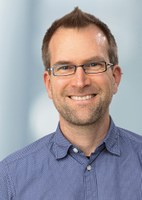“We want to decipher the genetic code of our universe”
Freiburg, Dec 11, 2023
The motto for Science Year 2023, which is coming to an end, is “Our Universe". Although the universe rarely plays a role in everyday life, this topic is a source of great fascination. "The view of the starry sky, of the Milky Way, is incredibly impressive. And it is closely linked to the question: How does this world in which we live work?" says Dr Marc Schumann, Professor for Experimental Astroparticle Physics from the University of Freiburg. Physics can explain the matter that characterises our life here on Earth: the Standard Model of particle physics describes the various elementary particles such as electrons, quarks and neutrinos and how they interact with each other.
This theory, says Schumann, currently predicts all the results of the experiments at CERN in Geneva “with breath-taking accuracy.” At the same time, it is known that the so-called baryonic matter, which the standard model describes, only makes up 5 percent of the content of the universe. The majority of the universe consists of components about which very little is known to date: 68 percent are dark energy and 27 percent dark matter. In several research teams, Schumann is investigating the nature of the dark matter particle.
Dark matter: a needle in the haystack
Dark matter does not interact with electromagnetic radiation. Instead, light simply passes through it. That is why Schumann and his colleagues are using a method that aims to detect dark matter particles indirectly via their interaction with atoms. “The measuring principle is very simple: it is like playing pool billard: The dark matter particle is the white ball and it’s invisible while the coloured balls are visible. In our detectors, these are atoms of the noble gas xenon. The idea is that if the white ball - that is, the dark matter particle - hits a coloured ball, then we can measure its movement triggered by dark matter.”
Video interview with Marc Schumann
So far, however, such a detection of dark matter particles has not yet been successful, as their interactions with ordinary matter are extremely rare. “We are looking for a needle in the haystack,” says Schumann. “That’s why we are trying to make the haystack as small as possible.” In concrete terms, this means that Schumann and his team are developing detectors that are well-shielded from various interferences. The detectors are located more than a kilometre underground as protection against the cosmic radiation that hits the earth from space. A layer of several meters of water protects against the radiation resulting from natural radioactive decays in the environment. The individual parts of the detector itself are also carefully selected and cleaned to minimise the radiation background.
“Ultimately, we want to decipher the genetic code of our universe in order to find the model behind the standard model, so to speak,” says Schumann. If the theme of a Science Year in a hundred years’ time is once again “Our Universe,” it is expected that the physics knowledge then will be very different from today. “In the past, individual experiments have overturned entire theories,” notes Schumann. “Nobody can predict what we will discover with current and future experiments.”
Marc Schumann is available for media interviews.
He is one of the spokespersons for the Cluster of Excellence initiative "PARTICLES - Breaking new ground in particle physics with innovative technologies and novel experiments", a joint project with the University of Heidelberg and the Karlsruhe Institute of Technology. Further information on this and the Freiburg Excellence Strategy as a whole can be found here:
https://uni-freiburg.de/university/topics-in-focus/excellence-strategy/

Marc Schumann
Professor for Experimental Astroparticle Physics
University of Freiburg
Tel: +49 761 203-96894
e-mail: marc.schumann@physik.uni-freiburg.de
Photo: Jürgen Gocke
Contact:
University and Science Communications
University of Freiburg
Tel.: +49 761 203 4302
e-mail: kommunikation@zv.uni-freiburg.de

